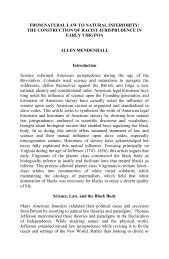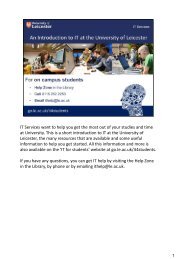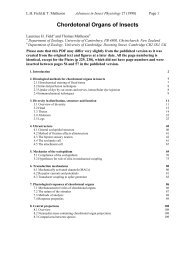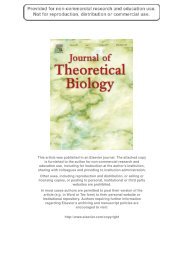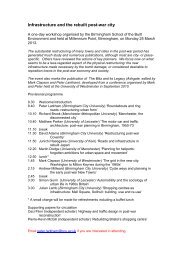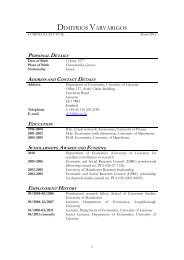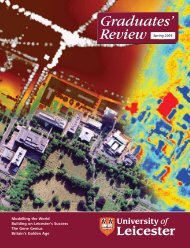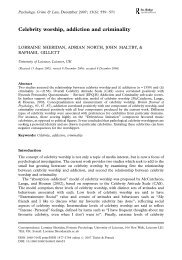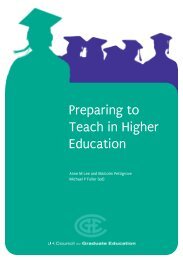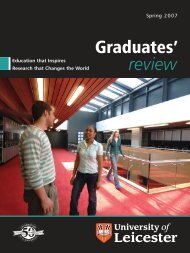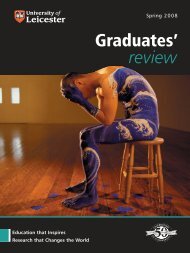Information Guide - University of Leicester
Information Guide - University of Leicester
Information Guide - University of Leicester
Create successful ePaper yourself
Turn your PDF publications into a flip-book with our unique Google optimized e-Paper software.
GENERAL STUDENT HANDBOOK 2013 -14ITable <strong>of</strong> ContentsWelcome/Introduction ............................................................................................................................................... 1Induction ..................................................................................................................................................................... 1For International Students ...................................................................................................................................... 2Department Details .................................................................................................................................................... 2Departmental Communications ............................................................................................................................. 2Staff List and Key Contacts ..................................................................................................................................... 3Members <strong>of</strong> Academic Staff ................................................................................................................................... 3Student Communications and Contact Details ....................................................................................................... 3Absence, Illness or other problems ........................................................................................................................ 4Communications ..................................................................................................................................................... 4Department Facilities ............................................................................................................................................. 4Semester Dates ....................................................................................................................................................... 5Term Dates ............................................................................................................................................................. 5Study Areas ............................................................................................................................................................. 5Computers and Terminals ...................................................................................................................................... 5Tutorial Rooms ....................................................................................................................................................... 6Departmental Common Room ............................................................................................................................... 6Foyer ....................................................................................................................................................................... 6Meetings Room ...................................................................................................................................................... 6Disabled access ....................................................................................................................................................... 6Drinks/Snacks Vending machines ........................................................................................................................... 6Green Impact .......................................................................................................................................................... 6Smoking .................................................................................................................................................................. 6Tidiness ................................................................................................................................................................... 6<strong>University</strong> Facilities ..................................................................................................................................................... 7<strong>University</strong> Library .................................................................................................................................................... 7IT Services ............................................................................................................................................................... 7<strong>University</strong> Bookshop ............................................................................................................................................... 7Other important <strong>University</strong> Services ...................................................................................................................... 8<strong>University</strong> Regulations ................................................................................................................................................ 8Examination Regulations ........................................................................................................................................ 8Student Responsibilities ......................................................................................................................................... 9Neglect <strong>of</strong> Academic Obligations ............................................................................................................................ 9Programme and Module Specifications ................................................................................................................. 9Course details ......................................................................................................................................................... 9Handing in <strong>of</strong> Seminar Work................................................................................................................................... 9PHYSICS AND ASTRONOMYUNIVERSITY OF LEICESTER
GENERAL STUDENT HANDBOOK 2013 -14IILecture course codes ............................................................................................................................................ 10Laboratory Classes ................................................................................................................................................ 10Introduction to Computing ................................................................................................................................... 10Lectures ................................................................................................................................................................ 11Exercise workshops .............................................................................................................................................. 11Maths workshops ................................................................................................................................................. 11Physics Workshops ............................................................................................................................................... 11Seminars ............................................................................................................................................................... 11Submission <strong>of</strong> work .............................................................................................................................................. 12Quick <strong>Guide</strong> Booklet ............................................................................................................................................. 12Question Booklets ................................................................................................................................................ 12Multiple choice questions .................................................................................................................................... 12Small group tutorials ............................................................................................................................................ 12Revision classes .................................................................................................................................................... 13Assessment ........................................................................................................................................................... 13Summer Examinations .......................................................................................................................................... 13Examination anonymity ........................................................................................................................................ 14Calculators ............................................................................................................................................................ 14ERASMUS Exchanges, Years Abroad, Industrial Placements ................................................................................ 14Attendance Requirements .................................................................................................................................... 14Teaching Timetable .............................................................................................................................................. 15Coursework Submission ....................................................................................................................................... 15Late Work ............................................................................................................................................................. 15Change <strong>of</strong> Course/Module ................................................................................................................................... 15Learning Development ............................................................................................................................................. 15Marking and Assessment Practices .......................................................................................................................... 16Feedback and the Return <strong>of</strong> Work from Staff ...................................................................................................... 16Progression and Classification <strong>of</strong> Awards ............................................................................................................. 16Assessment Pr<strong>of</strong>iles .............................................................................................................................................. 17Resits ..................................................................................................................................................................... 17Appeals procedures .............................................................................................................................................. 17Referencing and Academic Honesty ......................................................................................................................... 17Cheating in written examinations ........................................................................................................................ 17Plagiarism and collusion ....................................................................................................................................... 18Penalties ............................................................................................................................................................... 18Avoiding Plagiarism and Poor Academic Practice ................................................................................................ 18Turn-it-inUK .......................................................................................................................................................... 18Collaboration ........................................................................................................................................................ 18PHYSICS AND ASTRONOMYUNIVERSITY OF LEICESTER
GENERAL STUDENT HANDBOOK 2013 -14IIINotification <strong>of</strong> Ill Health and Other Mitigating Circumstances ................................................................................ 19Personal Support for Students ................................................................................................................................. 19Departmental Student Support Arrangements .................................................................................................... 19Your personal (or university) tutor ....................................................................................................................... 19Your academic tutor ............................................................................................................................................. 19Senior Undergraduate Tutor: ............................................................................................................................... 19Equal Opportunities .............................................................................................................................................. 19<strong>University</strong> Student Support Arrangements .......................................................................................................... 20Students’ Union Education Unit (ED).................................................................................................................... 21Careers and Employability .................................................................................................................................... 21Personal Development Planning .......................................................................................................................... 23Feedback from Students ........................................................................................................................................... 24Feedback ............................................................................................................................................................... 24Evaluation <strong>of</strong> courses ............................................................................................................................................ 24Student Staff Committees .................................................................................................................................... 24Departmental Prizes ................................................................................................................................................. 24Societies .................................................................................................................................................................... 25AstRoSoc ............................................................................................................................................................... 25<strong>Leicester</strong> <strong>University</strong> Physics Society (LUPH) ......................................................................................................... 25Safety and Security ................................................................................................................................................... 25Emergency Evacuation ......................................................................................................................................... 25Personal Belongings .................................................................................................................................................. 25Complaints and Academic Appeals Procedures ....................................................................................................... 26FULL MODULE INFORMATION FOR ALL YEARSFull module descriptions for all years are available at:http://www2.le.ac.uk/departments/physics/admissions/module_infoAssessment guidelines are available by following the link above and then the route below:Detailed module List> Open> Assessment System- brief guide (located in the information bar at the top <strong>of</strong> themodule list)PHYSICS AND ASTRONOMYUNIVERSITY OF LEICESTER
GENERAL STUDENT HANDBOOK 2013 -14 2For International StudentsAny international students who arrive late please contact Merry Coates, departmental secretary in room G44APhysics BuildingDepartment DetailsDepartment <strong>of</strong> Physics & Astronomy<strong>University</strong> <strong>of</strong> <strong>Leicester</strong><strong>University</strong> Road<strong>Leicester</strong>LE1 7RHTeaching Office: Telephone: 0116 252 3575Physics Building Fax: 0116 252 2070Room G44ahttp://www2.le.ac.uk/mapsThe Physics and Astronomy Department has a comprehensive webpage outlining the department and itsfacilities which can be found at http://www2.le.ac.uk/departments/physics.The <strong>University</strong> and Department webpages contain a lot <strong>of</strong> useful information, but please be aware that much <strong>of</strong> this information is for the currentacademic year only; information for later years than your own may be subject to change as you progress.Please find below a link to our full department staff list:http://www2.le.ac.uk/departments/physics/people/staff-listDepartmental CommunicationsThe Department runs an “open door” policy. This policy is in place to ensure that, if you have an issue you wouldlike to discuss, you will always have access to an appropriate member <strong>of</strong> staff throughout normal <strong>of</strong>fice hours.However, it is important to realise that this does not mean you will have access to a specific member <strong>of</strong> staff atall times. We are a research active Department and the nature <strong>of</strong> this work means that staff members <strong>of</strong>tenhave to visit other research institutions around the world. While it may not be possible to take a question to aparticular person, you can be assured that there will always be someone on hand to help you.The Departmental Office and Teaching Office is your first point <strong>of</strong> contact for all enquiries relating to yourcourse. This includes matters relating to admissions, registration, enrolment, timetables and room bookings,scheduled classes, absences and illnesses, first aid etc. Staff in the <strong>of</strong>fice will advise accordingly and, if necessary,refer you to the appropriate person to deal with your enquiry.The <strong>of</strong>fice is open for enquiries from 9.00 am to 4.30 pm Monday to Friday.Administrative staffJoan Collier Teaching Administrator G44a JL28@le.ac.uk 2073Merry CoatesKiri RhodesDaxa PatelUndergraduate Admissions andDepartmental SecretaryUndergraduate Attendance andPostgraduate AdmissionsOffice Manager & PA to Head <strong>of</strong>DepartmentG44a MC323@le.ac.uk 3575G43 KR124@le.ac.uk 3570G42 DP204@le.ac.uk 3574PHYSICS AND ASTRONOMYUNIVERSITY OF LEICESTER
GENERAL STUDENT HANDBOOK 2013 -14 3Should any serious or urgent matter arise, your personal tutor can be contacted at any time during the workingday. Your tutor will either see you immediately or will make an appointment to meet you. If your tutor is notavailable you should contact the staff in the Departmental Office, who will make an appointment for you to seeyour tutor or arrange for you to see someone else.Staff List and Key ContactsPlease find below a link to our full department staff list:http://www2.le.ac.uk/departments/physics/people/staff-listMembers <strong>of</strong> Academic StaffHead <strong>of</strong> Year 1 Laboratory: Dr Darren Wright is in charge <strong>of</strong> the First Year Laboratory and any problemsconcerning the lab should be brought to his attentionHead <strong>of</strong> Year 2 Laboratory: Pr<strong>of</strong> Paul O’Brien is in charge <strong>of</strong> the 2nd Year Laboratory. Any unresolved problemsshould be brought to his attention.Head <strong>of</strong> Year 3 Laboratory: Dr Gordon Stewart is in charge <strong>of</strong> the 3rd Year Laboratory. Any unresolved problemsshould be brought to his attentionStudent-Staff Committee The Department takes feedback from its undergraduate students very seriously. Oneeffective platform for students to relay feedback is the student-staff committee. Matters are usually raisedthrough the student representatives whose names will be posted on the green notice board next to the teaching<strong>of</strong>fice, but they can also be brought directly to the attention <strong>of</strong> the chairman or members <strong>of</strong> staff on thecommittee.Careers Tutor The Careers Development Service, Careers Tutor, and the network <strong>of</strong> Personal Tutors can helpensure that students receive the support and guidance they need. The Careers Tutor works with the staff in theDepartment and Careers Service to engage with students throughout the undergraduate degree programme anddeliver the Physics at Work elements <strong>of</strong> the course as well as the sessions organised by the Careers Service.Careers Tutors regularly meet with Careers Tutors in other Departments in the College <strong>of</strong> Science andEngineering and the Careers Development Service as part <strong>of</strong> the College Careers & Employability Working Group.This working group explores new initiatives and discusses the careers and employability strategy <strong>of</strong> the Collegeand Departments.International exchange The Department has bilateral exchange agreements with Universities in France,Germany, North America, Australia and Canada. Please see Pr<strong>of</strong>essor Mike Watson if you are interested infinding out more about study abroad.AccessAbility Tutor The Departmental representative for students with specific learning disabilities is Pr<strong>of</strong>essorSteve MilanDirector <strong>of</strong> Learning and Teaching: Dr Graham Wynn.Head <strong>of</strong> Department Pr<strong>of</strong>essor Mark LesterDepartmental Services Manager Stuart Lyon manages the provision <strong>of</strong> secretarial, technical and supportservices.Student Communications and Contact DetailsThe <strong>University</strong> keeps a record <strong>of</strong> your contact details – i.e. your term-time and vacation postal address(es),telephone number, any alternative (personal) email address, and your emergency contact person. It isimportant that this record is kept up-to-date.Email registry@le.ac.uk, using your <strong>University</strong> email account, to inform the <strong>University</strong> <strong>of</strong> any change to yourcontact details. Include your student number in the email.PHYSICS AND ASTRONOMYUNIVERSITY OF LEICESTER
GENERAL STUDENT HANDBOOK 2013 -14 4Check your <strong>University</strong> email account frequently to ensure that you do not miss any important communicationfrom the <strong>University</strong> or your department.Absence, Illness or other problemsYour first point <strong>of</strong> call for reporting absences is Kiri Rhodes in the Departmental Office – Telephone: 0116 2523570.Illness or incapacity should be reported to the Departmental <strong>of</strong>fice or your personal tutor as soon as possible.You must not leave it until after the examinations are over to reveal you have experienced a problem. It isessential to provide an appropriate sickness certificate from your GP or the Student Health Centre.Please report other problems to your personal tutor, who will treat the matter in complete confidence. If yourpersonal tutor is unavailable, contact the Departmental <strong>of</strong>fice for advice.Please be aware that the Department cannot invent or extrapolate marks for missed work. It is therefore in yourinterest to complete all continuously assessed work wherever this is possible. Any extenuating circumstanceswill be brought to the attention <strong>of</strong> the board <strong>of</strong> examiners, who may take such information into account inborderline cases.Please note that work handed in after set deadlines without good reason may not be marked.CommunicationsNotice boards: Please check notice boards regularly. Important notice boards are:• The timetable notice board in the foyer, on the approach to Lecture Room B.• The examination notice board in the foyer, on the approach to Lecture Rooms A & B.• The seminar notice board outside the Teaching Office.• The timetable changes noticeboard outside the Teaching Office• Urgent notices are posted in the foyer.• Student notice board on the rear wall <strong>of</strong> the Foyer.• Staff photographs are in the foyer, outside Lecture Room D.• Careers notice board, common roomYou must check your email regularly, it is used to communicate important information and assessment marks.Staff encourage email communication for non-urgent queries. You can find the email addresses <strong>of</strong> staff on theDepartment by following:http://www2.le.ac.uk/departments/physics/people/staff-listDepartment FacilitiesGeneral Regulations for Taught ProgrammesThe <strong>University</strong>’s regulations for taught programmes can be found at http://www.le.ac.uk/sas/regulationsThese contain rules and other important information about being an undergraduate or taught postgraduatestudent at the <strong>University</strong> <strong>of</strong> <strong>Leicester</strong>. The Regulations are part <strong>of</strong> the formal contract between you and the<strong>University</strong>; you will have confirmed when completing registration that you will comply with procedures definedin the <strong>University</strong>’s Regulations.PHYSICS AND ASTRONOMYUNIVERSITY OF LEICESTER
GENERAL STUDENT HANDBOOK 2013 -14 5The information in this guide applies to the single subject (given by one department) degrees <strong>of</strong>fered by theDepartment. These are• Physics (P)• Physics with Nanoscience and Technology (N)• Physics with Astrophysics (A)• Physics with Space Science and Technology (S)• Physics with Planetary Science (G)All <strong>of</strong> which have BSc (3 year) and MPhys (4 year) programmes. The letters in brackets provide a shorthandreference to the courses.Semester DatesSemester One Monday 30 September 2013 – Friday 24 January 2014Semester Two Monday 27 January 2014 – Friday 27 June 2014Term DatesAutumn Term 30 September – 13 DecemberSpring Term 13 January – 28 MarchSummer Term 5 May – 27 JuneStudy AreasStudy Area F: (First floor, in the corner by the top <strong>of</strong> the rocket). This room provides group workspace for all year1 students and is for use by year 1 students only. Groups (usually tutor groups) are assigned to eachworkspace/table. Each group will have a computer and a cupboard for books and equipment. The security <strong>of</strong> thisequipment will be your responsibility.Study area F is available for private study when not in use for teaching. Please keep the room tidy. Because itcontains electrical equipment food and drink must not be taken into this room. This rule will be strictly enforced:anyone found to be breaking it will be excluded from the room outside scheduled classes. Wiring for power anddata mean it is not possible to move the tables; if you move the seating please put it back so that it is ready forclasses.Study Area E: This area (including the computer terminals) is for the use <strong>of</strong> 2nd, 3rd and 4th year students,unless otherwise indicated.Computers and TerminalsPlease note that the computers are for the use <strong>of</strong> Physics and Astronomy Department students only (includingInterdisciplinary Science, Mathematics with Astronomy students taking Physics modules as well as variousgroups <strong>of</strong> <strong>of</strong>ficial visitors to the Department).Computer Room H: This houses computers and terminals available to all students in the Physics Department.These terminals will also be required for teaching, during which times access will be restricted. There is also aprinter in this area. Computer Room H is for QUIET group study. If you do not adhere to this you will be asked toleave the room.Media Suite G: This is also an open access computer suite for Physics Department students, again with restrictedaccess when in use for teaching.Rooms G and H: Are shared with students from 2nd, 3rd and 4th years and with Interdisciplinary Science soplease be considerate to other users.PHYSICS AND ASTRONOMYUNIVERSITY OF LEICESTER
GENERAL STUDENT HANDBOOK 2013 -14 6Tutorial Rooms(K, L, M, N, O, P, Q) These rooms are used for scheduled small group teaching sessions. They may also be bookedvia staff in the Departmental Office, for meetings by students. Rooms K to O are on the first floor. P and Q are onthe ground floor along the back corridor by the rocket. All rooms are equipped with interactive whiteboards orplasma screens as well as a standard whiteboard. Room O is equipped with video conferencing facilities.Departmental Common Room (by the middle staircase on the first floor)is a general study and social area for staff and students. You may consume food and drink in this area oncondition that you use the bins provided for rubbish and the area is kept clean and tidy. You will also find ourcareers notice board located in the common room.FoyerThe seating area in the foyer is a good meeting point. It was not designed as a work area but can be used for thispurpose. There are further informal seating areas on the 1st floor.Meetings Room (next to the entrance to the 1st year lab)is divided into two sections. The front section, accessed from the first floor foyer, is a research facility;undergraduates are not allowed to use this without a member <strong>of</strong> staff. The rear section (accessed through H)may only be used when not required by staff. It is absolutely forbidden to take food or drink into this room.Disabled access is located at the far entrance <strong>of</strong> the buildingThe Disabled Toilet is situated in the foyer next to the student pigeon holes before Lecture Theatres A, B & CLift to basement and first floor is situated between the front and back corridor <strong>of</strong> the ground floorDrinks/Snacks Vending machines are situated on the first floor near the Meetings Room. Pleasenote that food and drinks must not be taken into the teaching areas.Stores Situated at the far end <strong>of</strong> the front corridor, ground floor.Green ImpactThe Department is actively engaged in a <strong>University</strong> wide initiative to reduce the environmental impact <strong>of</strong> ourbusiness. Details <strong>of</strong> the scheme can be found on the website <strong>of</strong> the <strong>University</strong>’s dedicated Environment Teamwww.le.ac.uk/environment. The Departmental Coordinator for physics is Daxa Patel email dp204@le.ac.uk.Cooperation by students is both necessary and appreciated to help the Department achieve these goals. Someways that you can help include cutting down on waste and recycling as much as possible. Please ensure that allwaste is disposed <strong>of</strong> in the appropriate bins that can be found around the Department and other areas <strong>of</strong>campus.SmokingThe Department operates a no-smoking policy in all areas. It would be greatly appreciated if smokers did notleave evidence <strong>of</strong> their activity on the entrance steps to the building.TidinessThere are good reasons why we restrict where you can consume food and request you to keep the building tidy.Food and drink may be consumed in the Common Room ONLY and are not allowed in the teaching / study /computer areas. The cleaning staff must be treated with the same respect as the any other member <strong>of</strong> staff. Thisincludes using the bins provided for any rubbish.PHYSICS AND ASTRONOMYUNIVERSITY OF LEICESTER
GENERAL STUDENT HANDBOOK 2013 -14 7<strong>University</strong> Facilities<strong>University</strong> LibraryThe Library is your gateway to high quality information relevant to your studies. Using it effectively contributesdirectly to your success.The Library provides you with:• access to a huge range <strong>of</strong> specialist information resources including a print collection <strong>of</strong> over 1 millionitems and a Digital Library <strong>of</strong> over 250,000 eBooks and 20,000 electronic journals which you can usefrom anywhere on the Web;• help in finding and using information; online, face to face and by telephone;• individual and group study space;• PCs, netbooks and wireless networking for your laptop;• services for distance learners.The Library is a shared resource for all members <strong>of</strong> the <strong>University</strong>. Please respect it and observe the Libraryregulations available at www.le.ac.uk/library/about.To get started, visit www.le.ac.uk/library.Contact: David Wilson Library+44 (0)116 252 2043 | library@le.ac.ukIT ServicesWhilst studying at the <strong>University</strong> you will have a <strong>University</strong> IT account and email address. There are hundreds <strong>of</strong><strong>University</strong> PCs available with Office 2010 and many specialist programs to help you with your studies.Visit go.le.ac.uk/it4students for more information about:• Student email: Access your email and calendar anywhere, including on your smartphone or other mobiledevice;• Printing: print, copy or scan on campus; pay by topping up your print and copy account;• IT Help: visit the Help Zone in the Library, phone 0116 252 2253, email ithelp@le.ac.uk or attend atraining course;• Wifi: free access to eduroam wifi on campus, in halls or at other universities;• PCs on campus: there are over 900 PCs available, with 350 located in the David Wilson Library (including24/7 access during exam periods) and how to find other Student PC Areas;• Files: personal ‘Z: drive’ to store your files, which is backed up and available anywhere;• Blackboard Virtual Learning Environment: support and information for all your courses;• <strong>Leicester</strong> Digital Library: access to journals, databases and electronic books online;• Mobile app: Download the <strong>University</strong> mobile app.More information can be found at go.le.ac.uk/it4students<strong>University</strong> BookshopThe Bookshop is owned by the <strong>University</strong> and is located on the ground floor <strong>of</strong> the David Wilson Library.All prescribed and recommended texts are stocked, so that students can rely on the Bookshop for the books thatthey need in the course <strong>of</strong> their studies. We also sell a wide range <strong>of</strong> paperbacks and books <strong>of</strong> general interest.Books not in stock can be quickly provided to order.Greetings cards, a wide range <strong>of</strong> stationery items and <strong>University</strong> <strong>of</strong> <strong>Leicester</strong> branded merchandise and clothingare always available.PHYSICS AND ASTRONOMYUNIVERSITY OF LEICESTER
GENERAL STUDENT HANDBOOK 2013 -14 8The opening hours are:Monday to Friday 9.00 a.m. - 5.30 p.m. (5.00 p.m. in vacations)Saturday10.00 a.m. - 2.00 p.m.Contact: <strong>University</strong> Bookshop, David Wilson Library+44 (0)116 229 7440bookshop@le.ac.ukOther important <strong>University</strong> Services• English Language Training Unit (ELTU) http://www2.le.ac.uk/<strong>of</strong>fices/eltu• Languages at <strong>Leicester</strong> http://www2.le.ac.uk/departments/modern-languages/lal• Freemen’s Common Health Centre http://www2.le.ac.uk/<strong>of</strong>fices/fchc• <strong>University</strong> Chaplaincy and Prayer rooms for students http://www2.le.ac.uk/institution/chaplaincy<strong>University</strong> RegulationsSenate Regulations (www.le.ac.uk/sas/regulations) contain rules and other important information about beingan undergraduate or taught postgraduate student at the <strong>University</strong> <strong>of</strong> <strong>Leicester</strong>. The Regulations are part <strong>of</strong> theformal contract between you and the <strong>University</strong>; you will have confirmed when completing registration that youwill comply with procedures defined in the <strong>University</strong>’s Regulations.The Quick <strong>Guide</strong> to Student Responsibilities (www.le.ac.uk/sas/regulations/responsibilities) summarises some<strong>of</strong> your most important responsibilities as a student at <strong>Leicester</strong>, as defined in detail in the Regulations. Theseresponsibilities relate to:• attendance• submission <strong>of</strong> work by set deadlines• term time employment (full-time students – Home/EU and International)• illness or other circumstances impacting upon studies• maintaining your personal details• the additional responsibilities <strong>of</strong> international studentsFailure to adhere to student responsibilities can have serious consequences and may lead to the termination <strong>of</strong>your studies.Examination RegulationsIf your course involves any exams you must ensure that you are familiar with the <strong>University</strong>'s ExaminationRegulations (www.le.ac.uk/sas/assessments/examregs). These contain a variety <strong>of</strong> regulatory information andinstructions relating to exams, including the rules governing:• scheduling• admittance• student conduct• permitted and prohibited items and clothing• use <strong>of</strong> calculators and dictionaries• absence due to illness• cheatingYou can also find information about exams in the Students’ <strong>Guide</strong> to Exams(www.le.ac.uk/sas/assessments/examsguide)PHYSICS AND ASTRONOMYUNIVERSITY OF LEICESTER
GENERAL STUDENT HANDBOOK 2013 -14 9Student ResponsibilitiesThe <strong>University</strong> expects its students to behave responsibly and with consideration to others at all times. The<strong>University</strong>’s expectations about student behaviour are described in:• the Student Charter• the Regulations governing Student Discipline• the Student Code <strong>of</strong> Social Responsibility• the Code <strong>of</strong> Practice governing Freedom <strong>of</strong> Speech• the <strong>University</strong>’s regulatory statement concerning Harassment and DiscriminationThese can be found at www.le.ac.uk/senate-regulationsNeglect <strong>of</strong> Academic ObligationsYou are expected to attend all learning and teaching events which are timetabled for you. These includelectures, tutorials or practical classes. You are also expected to submit work within the deadlines notified toyou. Persistent failure to attend taught sessions or to submit work, without good cause, will be considered to bea neglect <strong>of</strong> academic obligations. Departmental procedures for dealing with neglect are set out within the<strong>University</strong>’s disciplinary regulations (see www.le.ac.uk/senate-regulation11, paragraphs 11.52 – 11.61). In themost serious <strong>of</strong> cases <strong>of</strong> neglect the <strong>University</strong> has the right to terminate a student’s course.Programme and Module SpecificationsView the programme and module specifications for your course via www.le.ac.uk/sas/courses/documentationCourse detailsIn the programme specification you will find a summary <strong>of</strong> the aims <strong>of</strong> your course <strong>of</strong> study and its learningoutcomes, alongside details <strong>of</strong> its teaching and learning methods and means <strong>of</strong> assessment. The programmespecification also identifies the core modules that make up the course and any choice <strong>of</strong> optional modules. Eachmodule has its own specification that formally records that module’s aims, teaching and learning methods,assessment components and their percentage weighting.All <strong>of</strong> our degrees (see page 3 for a list) are structured so that all students take a common core <strong>of</strong> classes, whichencompass the basic concepts and techniques <strong>of</strong> physics. In addition, a series <strong>of</strong> specialist lectures are takenwhich are tailored to the flavours <strong>of</strong> the individual programmes. There is also a set <strong>of</strong> variants on these degreesincluding the possibility <strong>of</strong> a year in Europe (for both BSc and MPhys), a year in Industry (BSc only) and asemester in Australia, North America or Canada (MPhys only). Option RegistrationYou will be requested to register your selected option courses by the dates below to the Teaching Office.Semester 1: by Wednesday 20 November 2013Semester 2: by Wednesday 12 March 2014Please see your individual handbooks for further information.You must see the senior tutor if you wish to nominate a different number <strong>of</strong> options.Handing in <strong>of</strong> Seminar WorkThe specific module and course booklets set out the attendance and submission <strong>of</strong> work required for eachcourse. No credit is given for work handed in late.Groups for mathematics and physics seminars will be posted on the notice board outside the teaching <strong>of</strong>fice(G44A, front corridor). It is important that you check this notice board each week as your groups may changedepending on the advancement options you take.PHYSICS AND ASTRONOMYUNIVERSITY OF LEICESTER
GENERAL STUDENT HANDBOOK 2013 -14 10The Group Lists will tell you:• Which groups you have been allocated to each week.• The name <strong>of</strong> the supervisor that will be marking the listed units.• The location and time <strong>of</strong> your seminar.Your marked work will be handed back to you during the seminar.Lecture course codesEach lecture course (or course unit) is given a code to identify it as a part <strong>of</strong> the module to which it belongs.These numbers are internal to the Department and are given in the module descriptions (the second half <strong>of</strong> thisbooklet). This information is required to enable you to identify the class times on the master timetable. Thecourse codes are constructed according to a pattern (level – course type identifier – sequence - 0 or variantidentifier), but the structure <strong>of</strong> the numbering scheme need never concern you.Laboratory ClassesLaboratory work forms an essential part <strong>of</strong> the training <strong>of</strong> a physicist.The laboratory sessions are designed to provide:• An introduction to basic methods <strong>of</strong> experimental physics including the use <strong>of</strong> standard apparatus andequipment.• An awareness <strong>of</strong> the limitations <strong>of</strong> measurement and methods <strong>of</strong> analysing experimental data.• Experience and practice in planning, carrying out and reporting on an experimental investigation.• An illustration <strong>of</strong> physical phenomena covered in lectures from a theoretical standpoint.Attendance at the Laboratory Classes is CompulsoryStudents who fail to attend laboratory classes regularly, or who do not take a serious attitude towards theclasses, will be reported to the Academic Committee and may lose their right to a September resit in the event<strong>of</strong> failure in the <strong>University</strong> examinations (see below).Part <strong>of</strong> the laboratory course is organised as laboratory workshops (see below). A laboratory induction sessionwill be held during the first week <strong>of</strong> term, explaining their organisation.Laboratory Assessment The laboratory programme consists <strong>of</strong> a mixture <strong>of</strong> group and individual workshops, pairexperiments, and group projects in both core physics and specialist topics. At the end <strong>of</strong> the semester the marksfrom all these elements are combined to give an overall mark for each student's practical work.In order to proceed to the next year <strong>of</strong> the degree each laboratory module must be passed. The laboratorymodules cannot be retaken.Laboratory Workshops This form <strong>of</strong> teaching is used for subjects where teaching requires immediate hands-onactivity. A first year laboratory workshop is:Introduction to Computing - Pr<strong>of</strong>essor Richard WillingaleYou need your UoL IT username and password to complete the workshops. These are provided as part <strong>of</strong> youronline registration with the <strong>University</strong>. The <strong>University</strong> runs two distinct operating systems: Micros<strong>of</strong>t Windowsand a local implementation <strong>of</strong> the UNIX operating system called ‘SPECTRE’. The First Year workshop uses the<strong>University</strong> IT Windows system. The Second Year Workshop uses the <strong>University</strong> IT SPECTRE system. All physicsstudents must check that they are registered as users <strong>of</strong> both systems prior to the Computing Workshops.Attendance at the Workshops is CompulsoryPHYSICS AND ASTRONOMYUNIVERSITY OF LEICESTER
GENERAL STUDENT HANDBOOK 2013 -14 11LecturesIt is not possible to learn your first year work entirely from the books. Although attendance at lectures is notmonitored, you will find it essential to attend the lectures since these will introduce the subject matter, highlightthe main points to study, show you how to tackle problems, specify the work you must do each week andprovide you with an opportunity to ask questions about anything you are having difficulty with. Note that thelecture courses do not provide a ready-made set <strong>of</strong> notes from which you can mug up for the examinations –you will be expected to construct your course notes from various sources yourselves.You must attend the various other aspects <strong>of</strong> the course, which will be used to monitor your progress. Failure toattend these sessions without adequate reason will be recorded and persistent failure will result in a report tothe senior tutor.Exercise workshopsAttendance at Exercise Workshops is CompulsoryThe course books contain a number <strong>of</strong> exercises designed to monitor your progress through the material. Thesewill form the basis <strong>of</strong> the assessed work in the exercise workshops.Maths workshopsYou should have begun your study <strong>of</strong> the chapter prior to the workshop. The workshop will then give you theopportunity to• work though the set questions you have not so far completed• seek help with the set questions• seek help with any other questions once you have completed the set tasks.You work individually, although you can discuss any problems with your group.Towards the end <strong>of</strong> the workshop you will each exchange your individual work with your neighbouring groupmembers. Staff will go through the answers to the exercises with the class. You will mark the work you haveexchanged and return it.Physics WorkshopsEach core physics module is made up <strong>of</strong> four units. There is one exercise workshop for each unit. In thesesessions you work in assigned groups <strong>of</strong> 4-5 students (typically your tutorial group) to solve set problems withthe help <strong>of</strong> staff. The problems are set in advance in the course booklet. You should therefore come prepared tothe workshops by ensuring that you have done the preliminary reading. You will also find it particularlybeneficial to attempt some <strong>of</strong> the problems prior to the workshop.At the start <strong>of</strong> the workshop you should record your attendance on the workshop sheet provided in the group towhich you have been assigned. The first part <strong>of</strong> the workshop will comprise the group attempting and sharingresults to the problems. Demonstrators will be on hand to assist. You will need to keep a neat copy <strong>of</strong> your work.After approximately 40-45 minutes you will exchange one copy <strong>of</strong> your group work with another group for peermarking. Answers to the problems will then be given so that work can be marked. Marks will be recorded onyour workshop sheet for the group as a whole.A member <strong>of</strong> staff may then go through selected problems in detail, either in the last part <strong>of</strong> the workshop or inthe follow-up lecture <strong>of</strong> that unit, while other members <strong>of</strong> the staff team will check your marking.SeminarsThis is the name we give to our small group teaching sessions. (Most other Universities and Departments callthem tutorials, but we want to avoid confusion with our separate tutorial programme.) Each student will bePHYSICS AND ASTRONOMYUNIVERSITY OF LEICESTER
GENERAL STUDENT HANDBOOK 2013 -14 12assigned to a group for core physics and for mathematical physics. This may or may not be the same group foreach. Seminars supervisors will mark assigned work and go through problems.Submission <strong>of</strong> workSeminar work must be submitted via the dedicated pigeon holes by 12.00 on the Friday prior to the week <strong>of</strong> theseminar unless otherwise instructed.Attendance at Seminars is Compulsory<strong>Information</strong> on arrangements for physics workshops and seminars and mathematics/ mathematical physicsseminars and workshops and experimental physics seminars is given on the seminar notice board (outside theTeaching Office). (This information will also be given by the lecturers concerned.) Any problems arising should bebrought to the attention <strong>of</strong> the Departmental Office, Teaching Administrator or Director for Learning andTeachning.If in doubt - ask!! (But please read your handouts first!)Quick <strong>Guide</strong> BookletThis contains a schedule <strong>of</strong> all you core modules including lectures, workshops and seminars. Also included arethe hand-in dates for all seminar questions as well as the dates on which you need to complete your multichoicequestions and take home tests on Blackboard. This should be consistent with the main timetable. If yoususpect that errors have crept in, then please ask! We do sometimes make mistakes and it is best to sort themout as soon as possible.Question BookletsMost <strong>of</strong> the core courses have an accompanying booklet containing multi-choice questions and the exercises forseminars and workshops. In some cases lecturers will provide this information as the course proceeds. Thisshould be consistent with the main timetable. If you suspect that errors have crept in, please ask. We dosometimes make mistakes and it is best to sort them out as soon as possible.Please note that replacement copies <strong>of</strong> lost booklets & quick guide will be charged for. A breakdown <strong>of</strong> costscan be viewed in the Teaching Office.Multiple choice questionsQuestion booklets contain multiple choice questions for the core courses. These are designed to help you testyour understanding <strong>of</strong> the core material and marks are not recorded for them. You submit your answers to thesequestions via the ‘Blackboard’ virtual learning environment (VLE). The web pages simply ask you to select fromanswers (a)-(j) for each question, they do not contain the question text. You should therefore attempt them witha question sheet handy. Blackboard will inform you if your answer is right or wrong. Any queries you may haveabout the answers to the multiple choice questions may be a good starting point for a tutorial discussion.Small group tutorialsAttendance at Tutorials is CompulsoryThe allocation <strong>of</strong> students to your tutors is made at registration. Students should see their tutors within the firstweek to arrange subsequent meetings. Your academic tutor will arrange, according to the timeslots allocated inthe Timetable, at least 16 tutorial classes for first and second year tutees (usually, but not necessarily seventimes a term in the first two terms and twice in the summer term). There are no regular academic tutorialsarranged for third-and fourth year students, but they should keep in touch with their personal tutors.Your tutor will set and mark two essays in the first year. This is designed to help you develop competence inwriting correct prose. (Technical scientific writing is developed as part <strong>of</strong> laboratory work.)PHYSICS AND ASTRONOMYUNIVERSITY OF LEICESTER
GENERAL STUDENT HANDBOOK 2013 -14 13Revision classes During the third term each lecturer will give one or more classes oriented towardsanswering examination questions. You should bring any problems you have from the course or from past papersto the sessions. These classes will be student led: it is important to realise that the main purpose <strong>of</strong> revisionclasses is to answer your questions, not to do your revision for you.AssessmentThe module regulations require that each module be passed in order to proceed to the next year <strong>of</strong> the course.This means that students must attain both an average mark over all modules in excess <strong>of</strong> the pass mark (40%)and at least 35% in each module. The components <strong>of</strong> assessment in each module are given under the modulelistings.The first year is principally a qualifying examination (i.e. admits you to the second year) and is comprised <strong>of</strong> level1 material only. Your degree classification is based on performances in courses at levels 2 and 3 (for BSc) and 2, 3and 4 (for MPhys). The mark for each year is determined from material <strong>of</strong> the corresponding level. Please referto the assessment guidelines for complete details <strong>of</strong> how all <strong>of</strong> your marks go towards your degree classificationand your assessment pr<strong>of</strong>ile.In addition to the continuously assessed elements there are term papers and summer examinations.Summer ExaminationsYou must ensure that you are familiar with the <strong>University</strong>'s Examination Regulations(http://www.le.ac.uk/sas/assessments/examregs). These contain a variety <strong>of</strong> regulatory information andinstructions relating to exams, including the rules governing:• scheduling• admittance• student conduct• permitted and prohibited items and clothing• use <strong>of</strong> calculators and dictionaries• absence due to illness• cheatingYou can also find information about exams in the Students’ <strong>Guide</strong> to Exams(http://www.le.ac.uk/sas/assessments/examsguide)Examinations are normally scheduled utilising two periods a day for the First Semester examinations (09.30 and14:30), and two slots a day for the Second Semester examinations (09.30 and 14:30). Examinations are held onsix days a week, Monday to Saturday, and special arrangements cannot be made to accommodate students’personal preferences, unless these arise from specific religious requirements identified by the student at thecommencement <strong>of</strong> the academic year, or are associated with support measures recommended by theAccessAbility Centre.The extent to which the timetabling <strong>of</strong> examinations can be adapted to meet the specific religious requirements<strong>of</strong> individual students will vary from case to case, but the <strong>University</strong> will make such alternative arrangements asare in its power, subject to the overriding requirements that the examinations must be scheduled within thepublished examination periods, and that alternative arrangements introduced for individual students must notdisadvantage the majority. Students making requests for special treatment on religious grounds shouldrecognise that measures designed to meet their needs might therefore involve an unavoidable element <strong>of</strong>inconvenience (for example, the requirement to remain incommunicado for a period <strong>of</strong> time).First-year, Single Subject students take a qualifying <strong>University</strong> examination towards the end <strong>of</strong> the academicyear. Past examination papers for core modules are available on Blackboard or in the library.All examination information is posted on the examinations notice board in the Foyer. The timetable for summerexaminations is set by the <strong>University</strong> Examinations Office, not the Department. The rubrics (instructions) for allPHYSICS AND ASTRONOMYUNIVERSITY OF LEICESTER
GENERAL STUDENT HANDBOOK 2013 -14 14Physics and Astronomy Department <strong>University</strong> examinations are posted on the examination notice board in theFoyer in the summer term.Note that for comparison with previous years the four physics core modules (PA1140, 1130, 1120, 1110)correspond very approximately to papers Py1-Py4 respectively and the mathematical physics modules (PA1710,1720, opt213, opt214) correspond approximately to PA171, PA172 (Mathematical Techniques in Physics). Papersprior to 1998 will not be a reliable guide to current examination content.Examination anonymityThe <strong>University</strong> has a system <strong>of</strong> anonymous marking for written examinations. Candidate numbers are issued t<strong>of</strong>irst-year undergraduate students on your student card. Students retain the same candidate number for theduration <strong>of</strong> their course.CalculatorsThe <strong>University</strong> permits only certain types <strong>of</strong> calculator in <strong>University</strong> examinations. Currently these are the CasioFX83 and FX85 models. It is your responsibility to provide this and familiarise yourself with its operation in goodtime. Other makes <strong>of</strong> calculator brought into the examination room will be impounded and the action will betreated as a breach <strong>of</strong> <strong>University</strong> examination regulations.ERASMUS Exchanges, Years Abroad, Industrial PlacementsStudy AbroadMPhys (with a year in Europe) MPhys students may opt to spend the third year at a European <strong>University</strong>.Students who wish to do this must register for the MPhys (Europe) degree and take an appropriate languagecourse during the first two years (or be demonstrably fluent in the language). A preliminary qualification may berequired.MPhys (with a semester in Australia or in North America) MPhys students may spend the first semester <strong>of</strong> thethird year at La Trobe <strong>University</strong> in Melbourne, Australia, at the State <strong>University</strong> <strong>of</strong> Arizona in the USA or atMcMaster <strong>University</strong>, Ontario, Canada. Students who wish to do this must register for the degree during thesecond semester <strong>of</strong> their second year.BSc (with a year in Europe) BSc students may spend their third year in a European <strong>University</strong>. Students who wishto do this must register for the BSc (Europe) degree and take an appropriate language course during the first twoyears (or be demonstrably fluent in the language). A preliminary qualification may be required. The year isassessed on a pass/fail basis and does not contribute to the degree classification.Details <strong>of</strong> these courses will be provided by Pr<strong>of</strong>essor Watson on request.Attendance RequirementsAttendance is compulsory and will be monitored. Failure to attend classes, or to take them seriously, will lead toyou being reported to the Academic Progress CommitteeAttendance is an essential requirement for success in your studies. The <strong>University</strong>’s expectations aboutattendance are defined in Senate Regulation 4: governing student obligations (see www.le.ac.uk/senateregulation4).Full-time students must reside in <strong>Leicester</strong>, or within easy commuting distance <strong>of</strong> the city, for theduration <strong>of</strong> each semester. You should attend all lectures, seminars, practical sessions and other formal classesspecified in your course timetable, unless you have been <strong>of</strong>ficially advised that attendance at a particular sessionis not compulsory or you have received formal approval for absence.In addition to other attendance monitoring practices, departments will monitor international studentattendance at two ‘checkpoints’ during each academic year, typically at a compulsory learning and teachingsession appearing in course or examination timetables. Students will not normally be notified <strong>of</strong> checkpointPHYSICS AND ASTRONOMYUNIVERSITY OF LEICESTER
GENERAL STUDENT HANDBOOK 2013 -14 15dates in advance. If you are an international student and you fail to meet attendance and/or checkpointsrequirements this may result in the termination <strong>of</strong> your course and the subsequent reporting <strong>of</strong> this to the UKBorder Agency, in line with <strong>University</strong> sponsor obligations.Teaching TimetableYou will be given a timetable at registration. There is also a timetable and list <strong>of</strong> lecture courses available on thenotice boards in the foyer.Timetable sessions are specified by course numbers, which may differ from module numbers in some cases.Lecture course numbers can be found in the lecture listings later in the book. Any problems with the timetableshould be reported immediately to Joan Collier. Detailed instructions on finding your way through the timetablewill be given at the first induction meeting.Amendments to the lecture schedule will be posted on the whiteboard outside the Teaching Office and emailnotifications sent to relevant year groups.Please note that the master timetable contains details <strong>of</strong> all activities. Some classes are given in duplicate for agiven year group. Students are required to attend only one <strong>of</strong> these. It will be made clear to you which one(usually via the seminar notice board).Workshop, laboratory and seminar times are also listed on the master timetable (with the suffix ‘w’ ‘L’ and ‘s’respectively). Your personal laboratory schedule will be announced at the laboratory induction meeting.Your tutor will arrange with you the times for your academic tutorials.Coursework SubmissionLate WorkWork handed in late without good reason will usually not be awarded a mark. In some circumstances a reducedmark may be given, in which case the extent <strong>of</strong> the penalty will be made clear to you. It is therefore importantthat you hand in as much <strong>of</strong> an assignment as you have completed by the deadline. Where there is a validreason for late submission every effort will be made to mark work, but this cannot be guaranteed.You should make sure that you submit your assignments by their due date to avoid any marks being deductedfor lateness. Penalties for late submission <strong>of</strong> coursework follow the <strong>University</strong> scheme defined in Regulationsgoverning the assessment <strong>of</strong> taught programmes (see www.le.ac.uk/senate-regulation7 orwww.le.ac.uk/sas/assessments/late-submission).Change <strong>of</strong> Course/ModuleDiscuss your options with your personal tutor, or another appropriate member <strong>of</strong> staff in your department, ifyou are considering a change <strong>of</strong> course or module. Changes <strong>of</strong> course or module require approval by yourdepartment and the <strong>University</strong>’s Registry and will only be allowed in certain circumstances.See www.le.ac.uk/sas/courses/transfercourse or www.le.ac.uk/sas/courses/transfermodule for details <strong>of</strong> theprocedures involved and deadlines that apply.Learning DevelopmentStudying for a degree is a stimulating, challenging and rewarding experience. In order to make the most <strong>of</strong> thisexperience, the <strong>University</strong> <strong>of</strong> <strong>Leicester</strong> provides a wide range <strong>of</strong> resources and services to support and enhanceyour academic development in areas such as essay-writing, critical thinking, independent learning and timemanagement.The Learning Development Team is here to help you develop the skills and abilities you need inPHYSICS AND ASTRONOMYUNIVERSITY OF LEICESTER
GENERAL STUDENT HANDBOOK 2013 -14 18Plagiarism and collusionPlagiarism is used as a general term to describe taking and using another’s thoughts and writings as one’s own.Examples <strong>of</strong> forms <strong>of</strong> plagiarism include:• the verbatim (word for word) copying <strong>of</strong> another’s work without appropriate and correctly presentedacknowledgement;• the close paraphrasing <strong>of</strong> another’s work by simply changing a few words or altering the order <strong>of</strong>presentation, without appropriate and correctly presented acknowledgement;• unacknowledged quotation <strong>of</strong> phrases from another’s work;• the deliberate and detailed presentation <strong>of</strong> another’s concept as one’s own.Any student who prepares or produces work with others and then submits it for assessment as if it were theproduct <strong>of</strong> his/her individual efforts (collusion) will be penalised. Unless specifically instructed otherwise, allwork you submit for assessment should be your own and should not have been previously submitted forassessment either at <strong>Leicester</strong> or elsewhere.See also www.le.ac.uk/sas/assessments/plagiarismPenaltiesThe <strong>University</strong> regards plagiarism and collusion as very serious <strong>of</strong>fences and so they are subject to strictpenalties. The penalties that departments are authorised to apply are defined in the Regulations governingstudent discipline (see www.le.ac.uk/senate-regulation11, paragraphs 11.62 to 11.77).Avoiding Plagiarism and Poor Academic PracticeCheck the Learning Development website for guidance on how to avoid plagiarismwww2.le.ac.uk/<strong>of</strong>fices/ld/resources/study/plagiarism-tutorialIf you are in any doubt about what constitutes good practice, ask your personal/academic tutors for advice ormake an appointment with Learning Development for individual advice. You can book an appointment online byvisiting: www.le.ac.uk/succeedinyourstudiesTurn-it-inUKIn order to combat plagiarism in the department we sometimes ask students to submit essays via Turn-it-inUK,which is our online plagiarism s<strong>of</strong>tware via Blackboard.Turn-it-inUK checks• against the database <strong>of</strong> other students work (across the UK)• against online journal papers• against websitesCollaborationMany modules <strong>of</strong>fer students the opportunity to work together in pairs or teams. Care should be taken to readdepartmental guidelines on how such modules are to be assessed.If a joint or collaborative report is requested, the team can work together right up to the point <strong>of</strong> submission.Individuals may be asked to indicate the sections <strong>of</strong> the report they contributed to, the assessment may be <strong>of</strong>the group itself or there may be an additional form <strong>of</strong> assessment, such as presentation session, which allows forindividualised grading. Some collaborative investigations require the submission <strong>of</strong> an independently producedreport from each team member. Similarly, some work undertaken on computers or in the laboratory may bejointly undertaken with other students, but the assessment will be conducted on an individual basis. If, at anyPHYSICS AND ASTRONOMYUNIVERSITY OF LEICESTER
GENERAL STUDENT HANDBOOK 2013 -14 19point, you are not sure what is required <strong>of</strong> you please seek clarification from the module convenor or anotheracademic tutor.Notification <strong>of</strong> Ill Health and Other Mitigating CircumstancesThe <strong>University</strong> recognises that students may suffer from a sudden illness or other serious and unforeseen eventor set <strong>of</strong> circumstances which adversely affects their ability to complete an assessment or the results they obtainfor an assessment. In such cases the mitigating circumstances regulations and procedures may be applied. Theseregulations are designed to ensure the fair and consistent treatment <strong>of</strong> all students.If your studies are affected in any way by illness or any other mitigating circumstance you must tell yourdepartment at the time that it occurs. You are also required to supply supporting evidence (e.g. a medicalcertificate) to your department by the relevant deadline. The deadline will be normally not later than seven daysafter the assessment deadline to which it relates.See www.le.ac.uk/sas/regulations/mitigation for full details <strong>of</strong> the mitigating circumstances regulations andprocedures, including the <strong>University</strong>’s definition <strong>of</strong> a mitigating circumstance.Personal Support for StudentsDepartmental Student Support ArrangementsYour personal (or university) tutor: At registration you will be allocated a personal tutor withwhom you can discuss any matters concerning your general welfare. Please make contact with your tutor in thefirst week <strong>of</strong> term. You must see your <strong>University</strong> tutor at least three times in the 1st term, twice in the 2nd termand once in the 3rd term.From discussion <strong>of</strong> academic progress, to friendly advice on personal matters; personal tutors are there toprovide support, advice and guidance on an individual level. Common topics for discussion may include coursechanges, study progress, module choices, exam results, career opportunities or more personal problems such asaccommodation or financial difficulties. The Department’s personal tutor system operates in accordance withthe Code <strong>of</strong> Practice on Personal Support for Students: http://www.le.ac.uk/sas/quality/personaltutorYour academic tutor In addition to the personal tutor you will be allocated an academic tutor with whomyou can discuss academic problems. As far as possible the same staff member will be both your academic andpersonal tutor. (See also Small Group Tutorials.)Senior Undergraduate Tutor: Pr<strong>of</strong>essor Richard Willingale is the Senior Undergraduate Tutor and isresponsible for all matters relating to student performance. He acts with the personal and academic tutors toprovide support for all undergraduates. Any problem or issue related to your study should be brought to hisattention, either directly or through your tutor. Where appropriate, the Senior Tutor will meet and advisestudents as to their best course <strong>of</strong> action. He can arrange for changes <strong>of</strong> modules, temporary suspension <strong>of</strong>studies, course transfers, student welfare and support services and counselling,Equal OpportunitiesStuart Lyon is the Department Equal Opportunities Officer. If you have any concerns you wish to raise relating toequal opportunities (ethnicity, gender, disability etc) please email Mr Lyon on srl8@le.ac.uk or speak to himdirect (G41, Ground floor Physics).PHYSICS AND ASTRONOMYUNIVERSITY OF LEICESTER
GENERAL STUDENT HANDBOOK 2013 -14 20<strong>University</strong> Student Support ArrangementsAccessAbility CentreDisabled access is located at the far entrance <strong>of</strong> the building.The Disabled Toilet is situated in the foyer next to the student pigeon holes before Lecture Theatres A, B & CLift to basement and first floor is situated between the front and back corridor <strong>of</strong> the ground floorThe Centre <strong>of</strong>fers a range <strong>of</strong> services to all students who have specific learning difficulties, such as dyslexia,disabilities or long-term conditions. Staff <strong>of</strong>fer one to one support, assessment <strong>of</strong> dyslexia, the co-ordination <strong>of</strong>alternative examination arrangements and assistance with applications for the Disabled Students' Allowance.The open access Centre acts as a resource base for students and staff and is a relaxed place for students to work.Its computers are equipped with specialised s<strong>of</strong>tware for screen enlargement; essay planning and speech outputs<strong>of</strong>tware is on the <strong>University</strong> network. The Centre has some specialised equipment (CCTV, enlarged keyboard,and chairs) and some for loan (chairs, laptops and digital recorders).Low-level photocopying and printingfacilities are also available. The Centre welcomes self-referrals as well as referrals from academic staff.Contact: AccessAbility Centre, David Wilson LibraryTel/minicom: +44 (0)116 252 5002 | Fax: +44 (0)116 252 5513 | accessable@le.ac.ukwww.le.ac.uk/accessabilityStudent Welfare CentreThe Student Welfare Centre <strong>of</strong>fers wide ranging practical support, advice, and information for students.Financial advice is <strong>of</strong>fered, with information on budgeting and funding. Specialised staff can advocate over lateloans and other financial issues. Students can apply for hardship grants and loans through the Service; andobtain assistance with applications to charities and trusts.For international students, the Student Welfare Service organises various Welcome programmes throughout theyear, the main five-day event taking place in September annually. Expert immigration advice is available;students are strongly advised to renew their visas through the scheme provided by Student Welfare. StudentWelfare also co-ordinates HOST weekend visits to British families and other hospitality visits to local families in<strong>Leicester</strong>. Specialised Officers also support students who experience financial or personal problems.A specialist <strong>of</strong>ficer can provide information over housing contracts and can assist students over disputes withneighbours/housemates.A legal advice clinic is held in conjunction with the School <strong>of</strong> Law.Contact: Student Welfare Service, Percy Gee Building (First Floor).Tel: +44 (0)116 223 1185 | Fax: 0116 223 1196 | welfare@le.ac.ukwww.le.ac.uk/welfareStudent Psychological and Healthy Living ServiceThis Service <strong>of</strong>fers a range <strong>of</strong> expertise and support for both the physical and psychological aspects <strong>of</strong> health andwellbeing in the context <strong>of</strong> your academic journey.Services on <strong>of</strong>fer include:Student Counselling SupportTime-limited, free and confidential counselling on a one-to-one or group basis, as appropriate, addressing bothacademic-related and personal issues.PHYSICS AND ASTRONOMYUNIVERSITY OF LEICESTER
GENERAL STUDENT HANDBOOK 2013 -14 21For information see our website: www.le.ac.uk/counsellingContact: Student Counselling Service+44 (0)116 2231780 | counselling@le.ac.ukStudent Mental Wellbeing SupportPractical and emotional one-to-one and group support to students managing mental health issues at the<strong>University</strong>.Contact: Student Support (mental wellbeing)+44 (0)116 252 2283 | mentalwellbeing@le.ac.ukwww2.le.ac.uk/<strong>of</strong>fices/ssds/student-support-mental-wellbeingStudent Healthy Living ServiceThe Student Healthy Living Service strives to help students enjoy a balanced life; the service helps individuals toidentify an approach to life which can improve their wellbeing, enhance study and reach their full potential. Theservice is committed to the delivery <strong>of</strong> health and wellbeing activities that support students in developing lifeskills. As well as supporting academic achievement, these skills are transferable and should prove beneficialthrough the transition from <strong>University</strong> to the demands <strong>of</strong> employment and graduate careers. The StudentHealthy Living Service works closely with the Freemen’s Common Health Centre and also provides direction toappropriate health care services. More information can be found on the Healthy Living Service website.Contact: Student Healthy Living Service+(0)116 223 1268 | healthyliving@le.ac.ukgo.le.ac.uk/healthylivingThese services are located at: 161 Welford Road (behind the Freemen’s Common Health Centre), <strong>Leicester</strong>LE2 6BFStudents’ Union Education Unit (ED)Education help and advice is provided by the Students’ Union for all students.If you would find it helpful to talk to someone outside <strong>of</strong> your department, we <strong>of</strong>fer a confidential and impartialservice to help and advise you about where to go and what to do. If you wish to come and talk to us about yourpersonal circumstances or academic worries, for example, exams or putting together an academic appeal, wewill provide a pr<strong>of</strong>essional and friendly service.You will find the Education Help and Advice staff in the Students’ Union Building on the first floor within theWest Wing. Opening hours are 10.00 am to 4.00 pm and you can either pop in or book an appointment bycontacting us on the details below:Contact: Students’ Union Education Unit (ED), Students’ Union (First Floor)+44 (0)116 223 1132/1228 | educationsu@le.ac.ukCareers and EmployabilityThe Department <strong>of</strong> Physics and Astronomy has embedded a range <strong>of</strong> activities and programmes into thecurriculum in order to enhance the employability <strong>of</strong> students. In addition, the close collaboration between theCareers Service and the Careers Tutor is aimed at providing students with guidance and support.The undergraduate coursework, projects, problem based learning, group research activities are all designed toprovide a range <strong>of</strong> pr<strong>of</strong>essional and transferrable skills to equip graduates with the tools to succeed in theirchosen career path. Students are provided on a regular basis updated transcripts <strong>of</strong> their performance whichPHYSICS AND ASTRONOMYUNIVERSITY OF LEICESTER
GENERAL STUDENT HANDBOOK 2013 -14 22include details <strong>of</strong> transferrable and pr<strong>of</strong>essional skills to aid in personal development and planning. PersonalTutors can assist students in interpreting these transcripts, which are also useful when drafting and planningCVs.The career development sessions that are embedded in the curriculum include:Year 1. A degree is not enough – highlights the importance <strong>of</strong> the course and on the need to start focusing onemployability skills, career development from the start <strong>of</strong> the undergraduate degree programme.Year 2. CV writing preparatory sessions with Personal Tutors, CV writing and refinement session with the CareersService, followed by CV review and feedback session with Personal Tutors.Year 2: Get Ahead Get Experience – focuses on the importance <strong>of</strong> gaining experience during the undergraduatecourse as well as thought processes and mechanisms that are in place to assist students. Examples <strong>of</strong>opportunities available are highlighted as well as how to access further information.Year 2: Physics at Work Seminar (June post exams) - <strong>Leicester</strong> graduates working in diverse sectors givepresentations focused on how a physics degree from the <strong>University</strong> <strong>of</strong> <strong>Leicester</strong> influenced their specific careerpaths and how the knowledge, pr<strong>of</strong>essional and transferrable skills gained were useful in the their chosen careerpath.Year 3: Countdown to Graduation – in year 3 students generally start to think about their immediate futurecareer path, employment opportunities, graduate placements and continuing education and pr<strong>of</strong>essionaldevelopment. This session focuses on these specific topics.Year 4: Countdown to GraduationWork experience module - option in year 3, students at the end <strong>of</strong> year 2 interested in taking this have to findtheir own graduate employment for 8 weeks and give a presentation to the 2nd year students. This option is alsoavailable to year 3 students on the 4 year programme.SURE Programme Year 3: Is run by Dr Mark Wilkinson and is the Science Undergraduate Research Experience, asix-week summer programme which will support up to eight undergraduate students to undertake researchwithin the Department <strong>of</strong> Physics and Astronomy and the Space Research Centre at the <strong>University</strong> <strong>of</strong> <strong>Leicester</strong>. Arange <strong>of</strong> projects will be available in the fields <strong>of</strong> astrophysics, space science, and condensed matter physics.Entry is through a competitive application procedure. This provides students with research experienceSummer placements available for year 2 and year 3 students are usually advertised during the year.Year in industry is open to Physics students. Opportunities are advertised by the Careers Service and enablestudents to take a year out to work in industry.International Placements <strong>of</strong>fered by the Department <strong>of</strong> Physics and Astronomy and Space Research Centre areadvertised during the course <strong>of</strong> the year.Promotion <strong>of</strong>: careers fairs, placement schemes, graduate schemes, year in industry schemes etc…Access to printed material related to careers and career development is provided.Promotion <strong>of</strong> online material made available by the Careers Service.Career Development ServiceYou need a first-class education; that’s a given. But you also need an edge, an advantage, a head-start in thecompetitive graduate recruitment world. With your drive and determination, the Career Development Servicecan help you gain the extra dimension you need to stand out – real-world skills and qualities that will not onlyenhance your early career prospects, but will stay with you for life.The way to make the most <strong>of</strong> you is to work with us the moment you arrive at <strong>Leicester</strong>. If you’re willing to takeresponsibility for your own journey at the outset, we’ve got the knowledge and resources to spur you on tosuccess.PHYSICS AND ASTRONOMYUNIVERSITY OF LEICESTER
GENERAL STUDENT HANDBOOK 2013 -14 23Careers at <strong>Leicester</strong> isn’t just about getting you some work experience, we look at the bigger picture. We’llencourage you to be reflective and think about what you want out <strong>of</strong> a career – what is it that really motivatesand inspires you? We’ll also get you thinking about what skills and experience you possess or need to help youachieve your goals.You can then explore your options and begin looking at what you need to do to fulfil those big ambitions.Starting early is key, when you arrive at <strong>Leicester</strong> you will already be registered on MyCareers, which is thegateway to all the opportunities on <strong>of</strong>fer, from volunteering, enterprise and business start-up, to elected<strong>of</strong>ficers, and student group leadership there are so many different ways to gain experience, many <strong>of</strong> which areaccredited by the <strong>Leicester</strong> Award, our flagship employability award, designed to help you develop, assess,recognise and record the employability skills you are developing.We want you to follow your passion. So whether you want to make a difference in the voluntary sector, reachthe top in high-flying business or be the next big thing in media, there are specially designed programmes andactivities here at <strong>Leicester</strong> that can support you in getting the skills, experiences and exposure you need.Contact: Career Development Service, The Hub, Percy Gee Building (Students' Union)+(0)116 252 2004 | careershelp@le.ac.ukwww.le.ac.uk/careersPersonal Development PlanningPersonal Development Planning (PDP) is designed to enable you to think about, and plan for, your own personal,academic and career development. Throughout your degree you will be encouraged to reflect on your progressand achievements, and to identify areas you wish to develop and improve on. PDP will help you to:• recognise the skills and abilities you are developing;• identify areas for improvement and development; and• think about how you can improve your employability and career prospectsPersonal Development Planning (PDP) is designed to enable you to think about, and plan for, your own personal,academic and career development. Throughout your degree you will be encouraged to reflect on your progressand achievements, and to identify areas you wish to develop and improve on. PDP will help you to:At least twice during the year your tutor will discuss with you your progress towards the goals you will set foryourself. You will receive by email a record <strong>of</strong> your progress to date to which you should add your writtencomments before forwarding to your tutor. You should keep a copy for future reference. It will help you t<strong>of</strong>ormulate and attain realistic ambitions, to make the most <strong>of</strong> your time at <strong>University</strong> and to generate a CV.Your degree programme has been carefully constructed by the Department, the Learning Development Unit andthe Careers Service to integrate the personal development <strong>of</strong> critical study, research and employment skills intothe curriculum at all levels and stages. During your course you will regularly work in groups, have theopportunity to lead teams, give presentations, compile reports, manage your time and solve problems. All <strong>of</strong>these skills are fundamental to gradual level employment and research opportunities. Specific modules addressthese skills directly, examples being the Physics at Work programme in all years, the year 3 Group IndustryProjects and Problem Based Learning sessions. Your growing strengths in these areas will be recorded on yourtranscripts as your progress through the course. Additionally, the Learning Development Team <strong>of</strong>fer furtheropportunities for personal development in many targeted areas.In addition, Learning Development provides some more general information about what PDP is, and how youcan engage with it: www2.le.ac.uk/<strong>of</strong>fices/ld/personal-development-planning-pdp.PHYSICS AND ASTRONOMYUNIVERSITY OF LEICESTER
GENERAL STUDENT HANDBOOK 2013 -14 24Feedback from StudentsFeedbackThe Department complies with the <strong>University</strong>’s policy for the return <strong>of</strong> marked coursework (seehttp://www.le.ac.uk/sas/quality/student-feedback/return-<strong>of</strong>-marked-work for details <strong>of</strong> the full policy:General principles:• Feedback and provisional grading on coursework will be returned within 21 days <strong>of</strong> the submission datefor campus-based programmes; 28 days for distance learning and approved programmes.• In exceptional circumstances where this is not possible, you will be notified in advance <strong>of</strong> the expectedreturn date and the reasons for the longer turn-round time and where possible staff will provide someinterim feedback: for example in the form <strong>of</strong> generic feedback to the class regarding common errors andpotential areas for improvementYou can expect detailed feedback on all submitted work either orally or in writing. The exact form that this willtake varies between modules. Details on feedback can be found in the outlines for each module.The exception to this rule is formal examinations. Usually, the only feedback you will receive on examinations isthe overall mark.Evaluation <strong>of</strong> coursesWe are continually striving to improve our courses and greatly value the opinions <strong>of</strong> our students. From time totime we will use questionnaires to survey your opinions on various course elements. In addition studentfeedback forms are available from the teaching <strong>of</strong>fice at any time for you to make comments on courses.You are welcome and encouraged to feedback your opinions to us at any time via your tutor, the senior tutor,the director <strong>of</strong> teaching, the chairman <strong>of</strong> the student-staff committee, your student representative or theteaching <strong>of</strong>fice. Your opinions will always be taken seriously.Student Staff CommitteesA Student Staff Committee exists for general discussion relating to the running <strong>of</strong> the Physics & AstronomyDepartment. Elections for student membership normally take place at the beginning <strong>of</strong> the academic year.Minutes <strong>of</strong> meetings and other information are posted on Blackboard.The SSC meets five times a year. The teaching <strong>of</strong>fice will contact students regarding representatives at the start<strong>of</strong> the academic year. Distribution <strong>of</strong> minutes is to the Committee members, members <strong>of</strong> staff and posted onBlackboard via.Student feedback>Course Documents>Student information>Student Staff Committee minutesDepartmental PrizesThe Department awards the following prizes:The Photonics PrizeThe Raymond Hide Prize for the best astronomy student in year 2The Astrium Space Science Prize for best space science final year studentThe Samuel and Rachel May Prize for the best final year studentThe Stewardson Essay PrizeIn addition a number <strong>of</strong> college prizes may be awarded. Recent prize-winners are listed on the boards in theFoyer.PHYSICS AND ASTRONOMYUNIVERSITY OF LEICESTER
GENERAL STUDENT HANDBOOK 2013 -14 25SocietiesAstRoSoc(Astronomy and Rocketeering Society) is a society dedicated to furthering interest in Astronomy and Rocketry,as such you can be part <strong>of</strong> regular stargazing events at the university’s observatory, and you will have the chanceto build and launch your own rockets. We also <strong>of</strong>fer opportunities to make new friends with similar interests, byholding several socials throughout the year. These socials may include bar crawls, pub quizzes, laser questing,joint socials with other societies and even a trip to the National Space Centre!<strong>Leicester</strong> <strong>University</strong> Physics Society (LUPH)This society is mainly aimed at anyone with an interest in Physics and having fun. Our aim this year is to bring alarger social side to the Physics degree course with lots <strong>of</strong> bar crawls and other social events throughout theyear including laser quest. This year we plan to have a larger number <strong>of</strong> academic events as well as our annualtrip to the National Space Centre and the return <strong>of</strong> the Big Science Pub Quiz. We hope to bring a closercommunity feeling to the department, as well as trying to integrate more with the other departmentsSafety and SecurityEmergency EvacuationIn the event <strong>of</strong> an emergency evacuation <strong>of</strong> the Physics Building, the fire alarm will sound. All personnel are toleave the building by the nearest safe exit and assemble in at the designated assembly point between theGeorge Porter and Archaeology Buildings. Lecturers are responsible for the lecture theatres in which they arelecturing when the alarm sounds.A system <strong>of</strong> fire wardens is in place within the building and the wardens will check and clear their designatedareas as they leave the building on evacuation, provided it is safe to do so. Fire wardens will be identifiable bytheir yellow fluorescent tabards.There will be no roll call at the assembly point. Anyone with knowledge <strong>of</strong> any person trapped in the buildingshould make a fire warden aware <strong>of</strong> that information at once; likewise, if any sign <strong>of</strong> a fire has been observed.In the event <strong>of</strong> an emergency evacuation <strong>of</strong> the building, no-one will be permitted to re-enter the building untilpermission has been given by the senior fire warden present, or by a Fire Service <strong>of</strong>ficer. The following will beresponsible for ensuring that the respective entrances listed are staffed to prevent premature re-entry:Mr P Stapleton:Loading BayDr SJ Gurman/Mr N Fisher: Main Entrance, Charles Wilson endMr P Glew: Main Entrance, Bennett endDuring <strong>of</strong>fice hours, the Fire Service will attend only if there is another indication <strong>of</strong> fire beyond the sounding <strong>of</strong>the alarm. Out <strong>of</strong> <strong>of</strong>fice hours, the Fire Service will attend as a matter <strong>of</strong> course. Upon the arrival <strong>of</strong> the FireService, the <strong>of</strong>ficer in charge should be informed immediately <strong>of</strong> the following:• The location and nature <strong>of</strong> any fire.• Whether any person is believed trapped within the building.• Any specific hazard in the area <strong>of</strong> the fire.Personal BelongingsYour personal belongings are not covered by the <strong>University</strong>’s insurance. You are therefore advised to checkwhether your parents’ or family policies provide adequate protection. If not, private insurance arrangementsshould be made.PHYSICS AND ASTRONOMYUNIVERSITY OF LEICESTER
GENERAL STUDENT HANDBOOK 2013 -14 26A lost property service operates from the Security Lodge, which is situated at the far end <strong>of</strong> the Fielding JohnsonBuilding on Wyggeston Drive, <strong>University</strong> entrance No. 1.Bicycles may be brought onto the main campus but must be placed in the cycle racks provided, and appropriatesecurity measures taken to help to prevent theft and damage. For advice on preventing cycle theft and details <strong>of</strong>the <strong>University</strong>’s Coded Cycle Scheme visit:www.le.ac.uk/estates/facilities_&_services/security/CodedCycleScheme.htmlComplaints and Academic Appeals ProceduresThe <strong>University</strong> has robust systems in place governing the quality and standards <strong>of</strong> its degree programmes andyour experience as a student here. We are confident that, like the vast majority <strong>of</strong> students here, you will enjoyand be satisfied with your course. In most instances your department will be able to resolve any issues that dooccur but we recognise that this will not always be possible. For this reason, the <strong>University</strong> has <strong>of</strong>ficialprocedures that allow eligible cases to be formally reviewed.<strong>Information</strong> about these procedures, including the relevant forms, can be found on the Student and AcademicServices website: see www.le.ac.uk/sas/regulations/appeals-complaints. These pages should be read inconjunction with the <strong>University</strong>’s Regulations governing student appeals (www.le.ac.uk/senate-regulation10)and Regulations governing student complaints (www.le.ac.uk/senate-regulation12).PHYSICS AND ASTRONOMYUNIVERSITY OF LEICESTER




